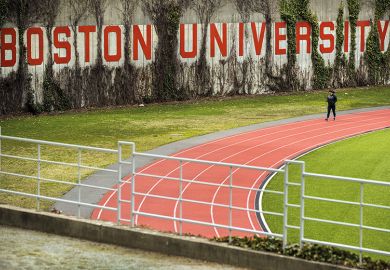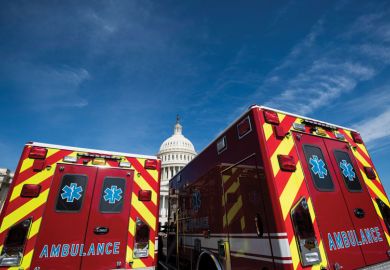More than 700 US colleges are reporting open spaces for the autumn semester, a record high solidifying fears that declining student demand may be cutting off their institutions’ last remaining hope for avoiding financial disaster.
The figure is more than 70 per cent larger than last year's level, when 419 US colleges still had freshman class openings by the start of May, and more than twice the usual rate over the past decade, the National Association for College Admission Counseling reported.
The NACAC figures are part of a solidifying body of evidence around the coronavirus pandemic that while colleges may be talking optimistically of a return to classrooms in the autumn, many of their students appear unconvinced and uninterested in courses taught through long-term use of online formats.
“The fact that there are a substantial number of colleges still searching for students, when they would typically be preparing for fall at this point,” said Melissa Clinedinst, NACAC’s associate director of research, “seems indicative of a particularly difficult admission cycle.”
Another ominous set of numbers, by the National College Attainment Network, shows an 8 per cent decline in the number of low-income students who have renewed their applications for federal student aid.
Those aid applications are regarded as a “strong indicator” of the direction of college enrolment, Kim Cook, the executive director of the non-profit network of groups advocating college preparation, said on Twitter.
Other recent surveys, involving students and college admissions officials, suggest similar pessimism about fall enrolment as both national and local government leaders admit doubts about the safety of allowing in-person classes.
Some analyses – by the services companies Cengage and SimpsonScarborough – have been warning that student enrolment could drop more than 20 per cent in the autumn if in-person classes aren’t possible.
Yet the prospect of keeping existing students and attracting new ones, while difficult in an online environment, may represent the last hope for many struggling colleges.
That’s because the federal government has given colleges far less bailout money than they say they need, while state lawmakers are expected to put colleges low on their priority list for assistance, behind demands that include unemployment-related relief, health care, and grade schools.
And even if large numbers of students do enrol this fall, many are already facing calls for tuition cuts corresponding to the deeply discounted rates at which they had previously been offering their online courses.
There’s also the challenge of attracting foreign students, who represent an oversized share of tuition dollars but may now be unable or unwilling to travel abroad.
The damage is already presenting itself, with many colleges and universities freezing or cutting salaries, if not laying off workers and eliminating programmes.
For a small number of elite institutions – such as Harvard University, which just admitted publicly that it expects to remain online in the fall – the economic effects of the coronavirus appear serious but not fatal.
Beyond Harvard, though, many institutions in both the US and Canada have been reluctant to acknowledge that they probably won’t be able to open their physical campuses in the autumn. A significant number of those, said Ben Nelson, head of the online Minerva Schools, could go under if their students will not embrace online formats.
To survive, Mr Nelson said, traditional institutions must put an urgent priority on teaching, and convince their students of that commitment. Steps should include focusing on the most important courses and discarding others, and making clear to faculty that quality instruction absolutely must come ahead of research, he said.
If colleges don’t do that, he added, “students are going to vote with their feet”. And that type of protest action, under these circumstances this year, may put large numbers of institutions out of business, Mr Nelson said.
Many others in higher education are pleading with students to avoid that kind of thinking, and to remember the long-term benefits of a college education.
The president of the University of California, Janet Napolitano, has argued openly that while online education may not be ideal, students may not have many better options during a society-wide shutdown.
Register to continue
Why register?
- Registration is free and only takes a moment
- Once registered, you can read 3 articles a month
- Sign up for our newsletter
Subscribe
Or subscribe for unlimited access to:
- Unlimited access to news, views, insights & reviews
- Digital editions
- Digital access to THE’s university and college rankings analysis
Already registered or a current subscriber?









